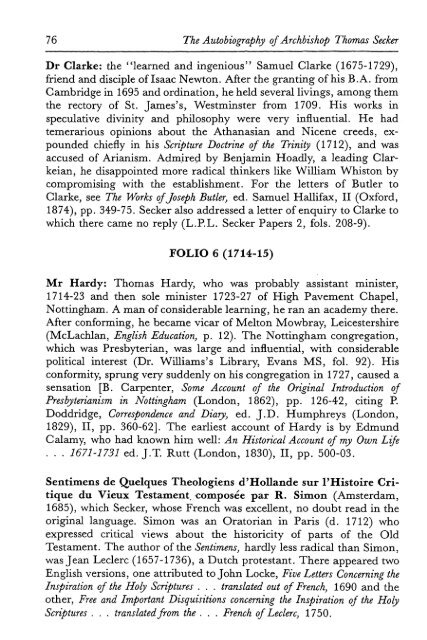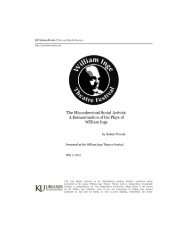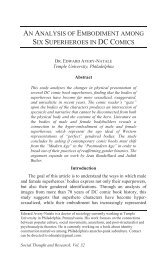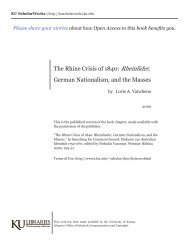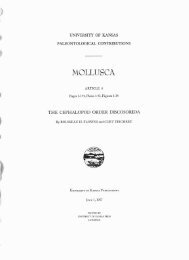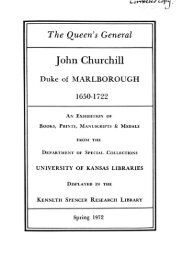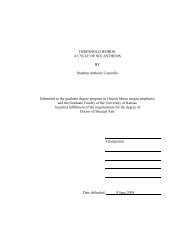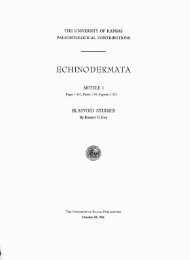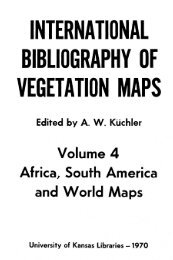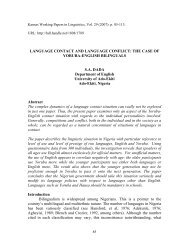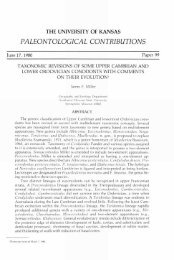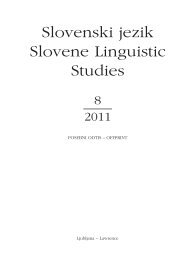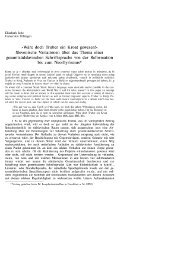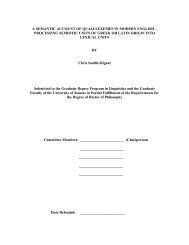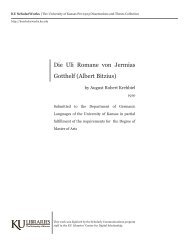Archbishop of Canterbury - KU ScholarWorks - The University of ...
Archbishop of Canterbury - KU ScholarWorks - The University of ...
Archbishop of Canterbury - KU ScholarWorks - The University of ...
You also want an ePaper? Increase the reach of your titles
YUMPU automatically turns print PDFs into web optimized ePapers that Google loves.
76 <strong>The</strong> Autobiography <strong>of</strong> <strong>Archbishop</strong> Thomas Seeker<br />
Dr Clarke: the "learned and ingenious" Samuel Clarke (1675-1729),<br />
friend and disciple <strong>of</strong> Isaac Newton. After the granting <strong>of</strong> his B.A. from<br />
Cambridge in 1695 and ordination, he held several livings, among them<br />
the rectory <strong>of</strong> St. James's, Westminster from 1709. His works in<br />
speculative divinity and philosophy were very influential. He had<br />
temerarious opinions about the Athanasian and Nicene creeds, expounded<br />
chiefly in his Scripture Doctrine <strong>of</strong> the Trinity (1712), and was<br />
accused <strong>of</strong> Arianism. Admired by Benjamin Hoadly, a leading Clarkeian,<br />
he disappointed more radical thinkers like William Whiston by<br />
compromising with the establishment. For the letters <strong>of</strong> Butler to<br />
Clarke, see <strong>The</strong> Works <strong>of</strong> Joseph Butler, ed. Samuel Hallifax, II (Oxford,<br />
1874), pp. 349-75. Seeker also addressed a letter <strong>of</strong> enquiry to Clarke to<br />
which there came no reply (L.P.L. Seeker Papers 2, fols. 208-9).<br />
FOLIO 6 (1714-15)<br />
Mr Hardy: Thomas Hardy, who was probably assistant minister,<br />
1714-23 and then sole minister 1723-27 <strong>of</strong> High Pavement Chapel,<br />
Nottingham. A man <strong>of</strong> considerable learning, he ran an academy there.<br />
After conforming, he became vicar <strong>of</strong> Melton Mowbray, Leicestershire<br />
(McLachlan, English Education, p. 12). <strong>The</strong> Nottingham congregation,<br />
which was Presbyterian, was large and influential, with considerable<br />
political interest (Dr. Williams's Library, Evans MS, fol. 92). His<br />
conformity, sprung very suddenly on his congregation in 1727, caused a<br />
sensation [B. Carpenter, Some Account <strong>of</strong> the Original Introduction <strong>of</strong><br />
Presbyterianism in Nottingham (London, 1862), pp. 126-42, citing P.<br />
Doddridge, Correspondence and Diary, ed. J.D. Humphreys (London,<br />
1829), II, pp. 360-62]. <strong>The</strong> earliest account <strong>of</strong> Hardy is by Edmund<br />
Calamy, who had known him well: An Historical Account <strong>of</strong> my Own Life<br />
. . . 1671-1731 ed. J.T. Rutt (London, 1830), II, pp. 500-03.<br />
Sentimens de Quelques <strong>The</strong>ologiens d'Hollande sur PHistoire Critique<br />
du Vieux Testament, composee par R. Simon (Amsterdam,<br />
1685), which Seeker, whose French was excellent, no doubt read in the<br />
original language. Simon was an Oratorian in Paris (d. 1712) who<br />
expressed critical views about the historicity <strong>of</strong> parts <strong>of</strong> the Old<br />
Testament. <strong>The</strong> author <strong>of</strong> the Sentimens, hardly less radical than Simon,<br />
was Jean Leclerc (1657-1736), a Dutch protestant. <strong>The</strong>re appeared two<br />
English versions, one attributed to John Locke, Five Letters Concerning the<br />
Inspiration <strong>of</strong> the Holy Scriptures . . . translated out <strong>of</strong> French, 1690 and the<br />
other, Free and Important Disquisitions concerning the Inspiration <strong>of</strong> the Holy<br />
Scriptures . . . translated from the . . . French <strong>of</strong> Leclerc, 1750.


